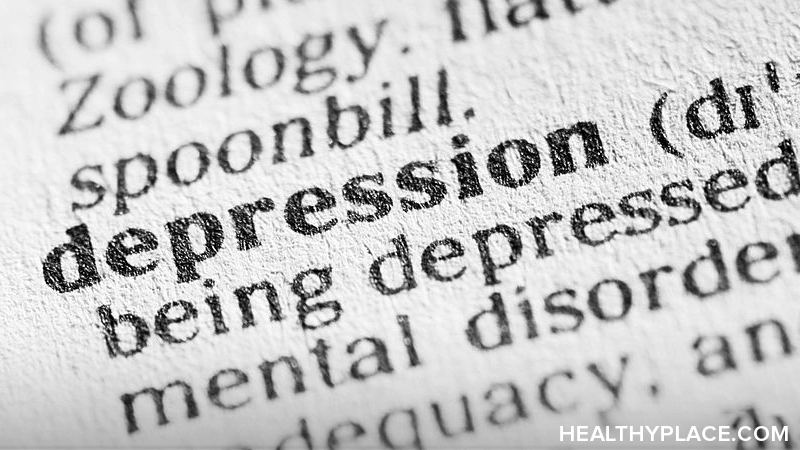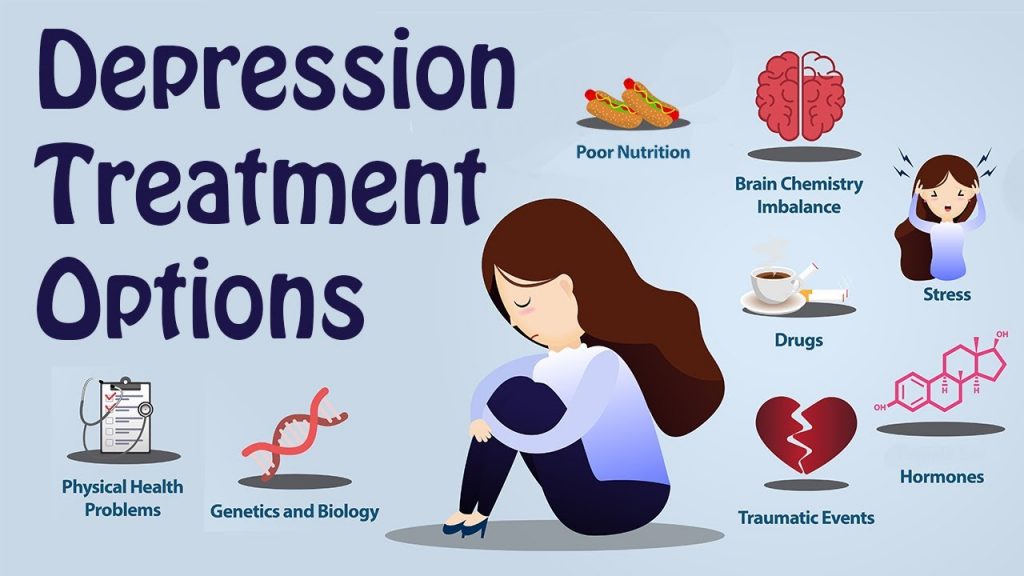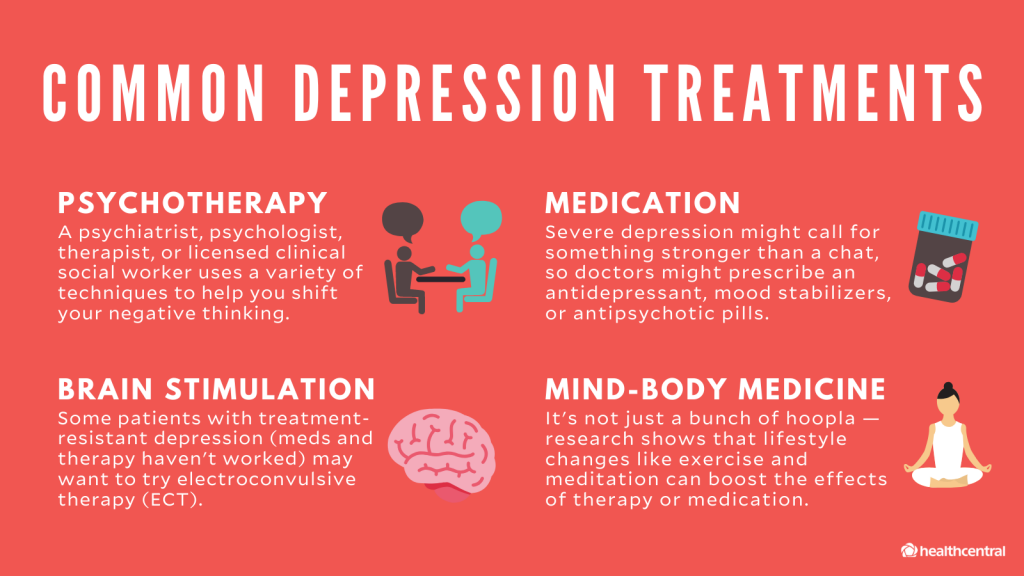
Depression : How should Treatment the best
What is Depression ?
Depression (major depressive disorder) is a common and serious medical illness that negatively affects how you feel, the way you think and how you act. Fortunately, it is also treatable. Depression causes feelings of sadness and/or a loss of interest in activities you once enjoyed. It can lead to a variety of emotional and physical problems and can decrease your ability to function at work and at home.
Depression symptoms can vary from mild to severe and can include:
- Feeling sad or having a depressed mood
- Loss of interest or pleasure in activities once enjoyed
- Changes in appetite — weight loss or gain unrelated to dieting
- Trouble sleeping or sleeping too much
- Loss of energy or increased fatigue
- Increase in purposeless physical activity (e.g., inability to sit still, pacing, handwringing) or slowed movements or speech (these actions must be severe enough to be observable by others)
- Feeling worthless or guilty
- Difficulty thinking, concentrating or making decisions
- Thoughts of death or suicide

Symptoms must last at least two weeks and must represent a change in your previous level of functioning for a diagnosis of depression.
Also, medical conditions (e.g., thyroid problems, a brain tumor or vitamin deficiency) can mimic symptoms of depression so it is important to rule out general medical causes.
What Are the Different Types of Depression?
Major depression : is the classic type of depression and what’s diagnosed, or labeled, as MDD (it’s also known as unipolar depression). People with major depression have symptoms of depression most of the day, nearly every day, for episodes of at least two weeks and can experience recurrent episodes throughout their lives. Under MDD, you can further break down depression into several specific subtypes:
- Seasonal Affective Disorder : (SAD) emerges during particular seasons of the year—commonly winter—brought on from diminished natural sunlight.
- Atypical Depression’s biggest differentiator is mood reactivity. People with this kind of depression see their mood improve when something positive happens.
- Bipolar Disorder used to be called manic depression and involves alternating between episodes of depression and extremely elevated energy.
- Psychotic Depression occurs when a person experiences depressive episodes so severe they start having false fixed beliefs (delusions) or hearing or seeing things that others can’t hear or see (hallucinations).
- Postpartum Depression occurs after giving birth. Mothers may feel disconnected from their new baby or fear that they could hurt their child.
- Premenstrual Dysphoric Disorder is a severe type of depression that shows up during the second half of the menstrual cycle.
- Situational Depression, or adjustment disorder, refers to depression that is triggered by a significant life-changing event.
- Persistent Depressive Disorder used to be called dysthymia. It’s a chronic form of depression—usually with milder symptoms—in which an episode lingers for a long period of time, sometimes two years or more. It could be described as feeling like you’re living on autopilot.
Best Treatment for Depression

Medications and psychotherapy are effective for most people with depression. Your primary care doctor or psychiatrist can prescribe medications to relieve symptoms. However, many people with depression also benefit from seeing a psychiatrist, psychologist or other mental health professional.
If you have severe depression, you may need a hospital stay, or you may need to participate in an outpatient treatment program until your symptoms improve.
Behavioral Therapy
Behavioral therapy focuses on the relationship between behavior and mood to target current problems and symptoms and focus on changing patterns of behavior that lead to difficulties in functioning.
Cognitive Therapy
Cognitive therapy entails modifying pessimistic evaluations and unhelpful thinking patterns with the goal of disrupting these and reducing their interference with daily life.
Cognitive-Behavioral Therapy (CBT)
Cognitive-behavioral therapy targets current problems and symptoms and focuses on recognizing the relationship between behaviors, thoughts, and feelings and changing patterns that reduce pleasure and interfere with a person’s ability to function at his/her best.
Interpersonal Psychotherapy (IPT)
Interpersonal psychotherapy focuses on improving problematic relationships and circumstances that are most closely linked to the current depressive episode.
Mindfulness-Based Cognitive Therapy (MBCT)
Mindfulness-based cognitive therapy combines strategies of cognitive therapy with mindfulness meditation to modify unhelpful thoughts and develop a kinder, more loving self-view.
Psychodynamic Therapy
Psychodynamic therapy focuses on unconscious thoughts, early experiences and the therapeutic relationship to understand current challenges, improve self-awareness and support the patient in developing more adaptive patterns of functioning.
Supportive Therapy
Supportive therapy offers a supportive relationship that focuses on helping people explore and understand their experience in their current situation. The focus is on strengthening a person’s ability to make choices that help them cope effectively with various life stressors, from a stance of genuine empathy and supportive listening.
Medications
Medication is often prescribed for the treatment of depression in adults. As each patient varies in his/her response and ability to tolerate a specific medication and dosage, medications must be tailored to the individual.
The bottom line
Having a bite of something chocolatey can really hit the spot when you’re feeling tired, stressed out, or in a bad mood. And that could because, in addition to tasting amazing, chocolate affects the brain in several profound ways
Source :

So precious health knowledge 😻
Noted
We should not ignore the depressive signs and symptoms.
Thanks for sharing…
I enjoy gathering utile information , this post has got me even more info! .
Thanks for sharing about Depression. I will get many knowledge from this article. Very useful article and tips for me. I think this article will give many knowledge to visitors. Nice website.
အရေးတော်ပုံ အောင်ရမည်
အရေးတော်ပုံ အောင်ရမည်
Thank ,😊
ဧရာသမိုင်း မရိုင်းစေရ
Fighting AYAWADDY
တွဲလက်မဖြုတ်ကြေး
ရောင်နီမြင်နေရပါပြီ 💪🏽💪🏽💪🏽
Good night 🌃🌃😪😪
Having a bite of chocolate is one of the therapy 😊
A bite of chocolate is one of therapy 😊
thanks for article
😍😍
Hi there!
Done
ဟုတ်ကဲ့ အားတင်းထားတယ် Great CHEyeCK ရေ
ကျေးဇူးပါ
Fighting Myat လေး✊❤️
စိတ်ကကျချင်ချင်ရယ်
မနည်းကောက်တင်ထားရတယ်
Thank you for your advice
I am feeling depressed since coup.
Thanks for sharing knowledge.
Thanks for your sharing.
Very useful knowledge! Thanks so much for sharing!
Thank for sharing mental health knowledge and therapy
Thanks for the article.
ခုချိန်မှာတော့ ကလစ်နေတာဟာ ဒီပရက်ရှင်လျှော့ချဖို့အကောင်းဆုံးအချက်လို့ထင်တယ် ကိုယ်တွေ့မို့😁
Anyway, thanks for your kindness.😍
Thanks for sharing